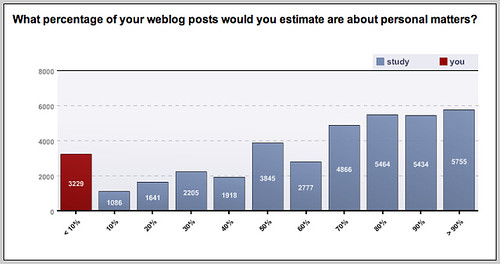Ken (I wish he had a blog to link to) pointed out Bloggers Need Not Apply in the Chronicle Of Higher Ed over the weekend. The story is to some a highly cautionary tale:
A candidate’s blog is more accessible to the search committee than most forms of scholarly output. It can be hard to lay your hands on an obscure journal or book chapter, but the applicant’s blog comes up on any computer. Several members of our search committee found the sheer volume of blog entries daunting enough to quit after reading a few. Others persisted into what turned out, in some cases, to be the dank, dark depths of the blogger’s tormented soul; in other cases, the far limits of techno-geekdom; and in one case, a cat better off left in the bag.
…and there’s more juice in the full story.
I had a lot of thoughts in response to the piece, including some scatter about changing modes of communication, the Google Economy, and whatnot, but in the middle of it I stumbled across Ryan Eby‘s post about the MIT Weblog Survey. Upon completing the survey, respondents are allowed to view their standings in the preliminary results.
 That’s where the graph above comes from. It turns out that of the 38,220 respondents so far, 88.71% report blogging about personal matters 20% of the time or more. I claimed that I posted on personal matters less than 10% of the time here at MaisonBisson (hopefully I correctly self evaluated that).
That’s where the graph above comes from. It turns out that of the 38,220 respondents so far, 88.71% report blogging about personal matters 20% of the time or more. I claimed that I posted on personal matters less than 10% of the time here at MaisonBisson (hopefully I correctly self evaluated that).
With those numbers, it’s easy to make the leap to presuming that the Chronicle author was seeing a lot of personal detail — much more than I would be comfortable with here.
David Rothman picked up on this story at TeleRead, where he sees some big upsides in blogging. For my part, I believe that blogging is the most open form of social bookmarking and that bloggers play a vital role in helping Google and others properly rank and organize the world’s information. While the Chronicle piece makes a good point about being careful about what we say and how we say it, I hope nobody sees it as an admonition against blogging.
Update: Had we known before hand what we’d get from TV and radio as those technologies were developing, we might have smartly given up. Technology, be it in the form of newspapers, blogs, or broadcasting can do little to change the problem that has troubled us since the birth of language: very little of what is written or said is worth paying attention to — even here at MaisonBisson.
That said, the technology is enabling new and different modes of communication. It’s worth alerting readers that old-media expectations don’t work with blogs. It’s not the publishing that matters, it’s the linking. The vetting process is in how and where a blog post is cited and the value is in the distributed conversations that develop.
